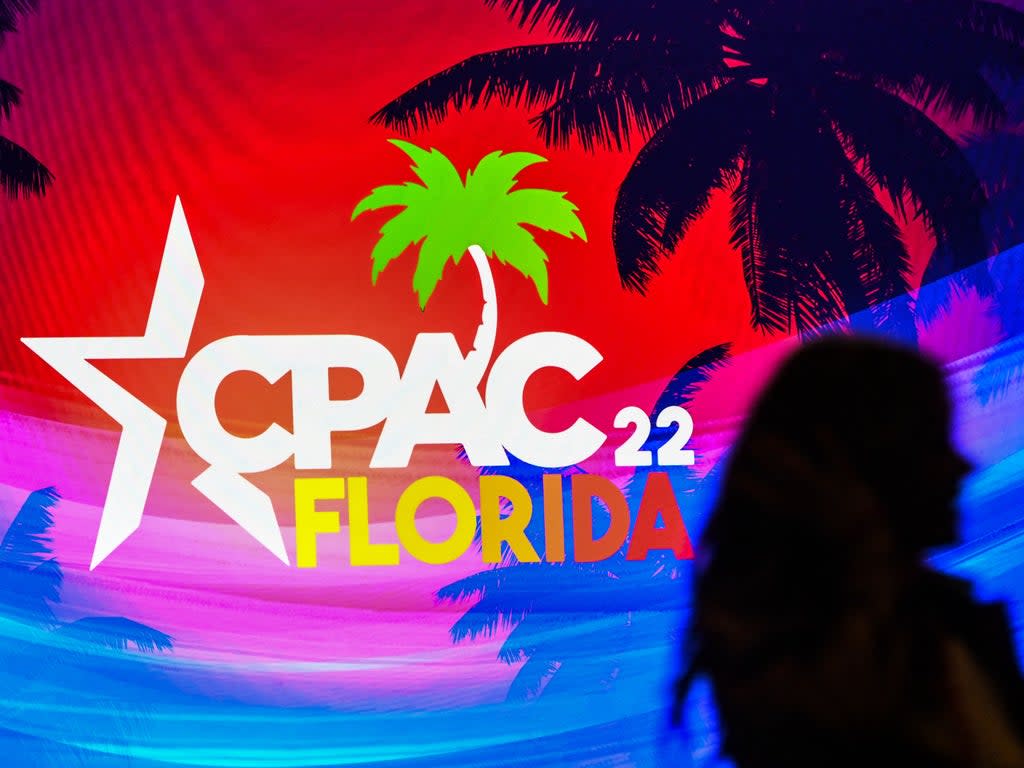Voices: CPAC has only just begun and it’s already disgraced itself

- Oops!Something went wrong.Please try again later.
- Oops!Something went wrong.Please try again later.
- Oops!Something went wrong.Please try again later.
It’s 3.00 am on Thursday, 24 February. Vladimir Putin has just invaded Ukraine, potentially launching the largest war in Europe since 1945.
I’ve spent most of my adult life reporting on Congress, the White House, and the inner workings of the US government. But on what might be one of the most consequential days in living memory, I’m nowhere near Washington.
Instead, I’m in Orlando, Florida for the largest yearly gathering of Republicans that you’ll find outside of the quadrennial presidential nominating conventions, otherwise known as the American Conservative Union’s Conservative Political Action Conference — or CPAC, for short.
Since 1974, when the first edition of what has become the ACU’s annual confab was keynoted by none other than Ronald Reagan — then the governor of California and the embodiment of the conservative movement’s hopes and dreams — it has become a can’t-miss date on young conservatives’ social calendars. These days, CPAC is a networking bonanza for ladder-climbing operatives and activists, and a veritable cattle call for reporters hoping to catch a few minutes with this or that Republican bold-faced name in a friendly environment.
I’ve covered CPAC before, first at the downtown Washington Marriott it called home for years, and more recently at the sprawling Prince George’s County, Maryland convention centre at National Harbor, where it decamped to during Donald Trump’s presidency.
And while the conference’s storied history might lead one to think I’m here to get a look at what the next generation of Republican luminaries has to say, there’s a subtle — even insidious — difference in this year’s program. Depending on who you ask, it may not bode well for the GOP’s future — or the futures of a generation of Republican hopefuls.
For the second year in a row, the most prominent speaker at the conference isn’t a senator, a governor, or even a reality TV star hoping to jump into presidential politics on the Republican ballot line. Instead, the “keynote” speakers — the last to take the stage on Saturday and Sunday — are two men with the same name: Donald John Trump. The former president will speak on Saturday to close out the day’s program, while his son Donald Jr will close out the conference the next day.
The man who many consider to be waiting in the wings if Trump doesn’t run — Florida governor Ron DeSantis — has been relegated to a relatively sleepy Thursday afternoon speaking slot. And Trump’s former vice president, Mike Pence, is persona non grata after declining to hijack the certification of electoral college votes to install himself and the former president in the White House for a second term.
Nor will other former headliners-turned-Trump critics be there. The man who has won more of CPAC’s annual straw poll than anyone else — 2012 GOP nominee and Utah senator Mitt Romney — was famously declared “not welcome” by ACU Chairman Matt Schlapp a few years back. Wyoming representative Liz Cheney — once considered CPAC “royalty” as the daughter of former vice president Dick Cheney — has also seen her name turn to mud in the minds of attendees, as has her colleague on the House January 6 select committee, Illinois representative Adam Kinzinger.
The rest of the agenda — all four days’ worth — is similarly dominated by the elder Trump, his former White House aides, his right-wing media supporters, and the vast constellation of allies who make up the expanded Trump-GOP universe.
At my last count, no fewer than 12 ex-Trump administration officials are slated to speak at this year’s CPAC. They range from the obscure (a trio of ex-ambassadors, Lynda Blanchard, Carla Sands and Lana Marks) to the ubiquitous (CNBC pundit-turned-Trump-aide-turned-Fox Business pundit Larry Kudlow and ex-press secretary Sean Spicer) to the notorious, such as ex-Defence Department aide Kash Patel and Sebastian Gorka, the bombastic Hungarian-British-American radio host who spent the first eight months of 2017 serving in an ill-defined White House job before being fired after failing to obtain the required security clearances to work there.
The subject matter they will cover is similarly Trumpy as well. From this year’s theme — “awake not woke” — to the various panel topics, which include “The Invasion,” “War through Weakness, Elections Matter,” “The Truth about January 6th,” “Making Middle East Peace Great Again” and “Persecution by Prosecution,” the entire schedule is less about building the future of conservatism than ever. Ironically, the one thing that seems to be “conserved” here is the supremacy of Trump and his galaxy of grievances.
On Monday, the complete and continued Trumpification of the GOP’s largest grassroots gathering would be an ordinary story on what would be just another day in America. But with Europe — and the world — facing the specter of war for the first time in generations, the continued focus of one of America’s two major parties on one man and his personal agenda seems particularly absurd. Even for devoted CPAC attendees, the optics of “America First” might come out looking that much worse for wear.

